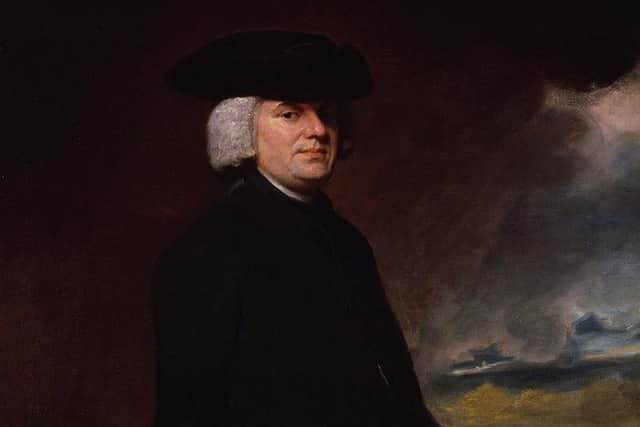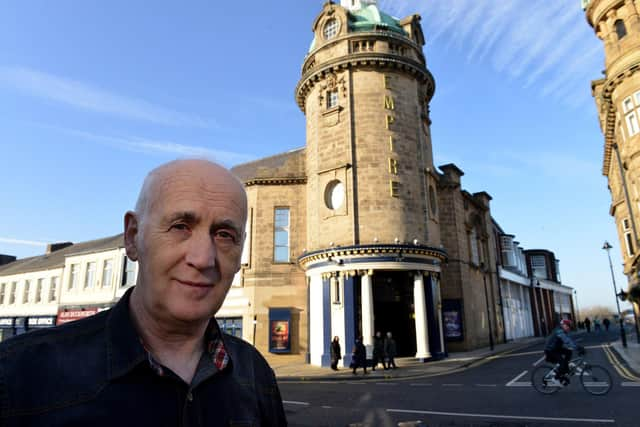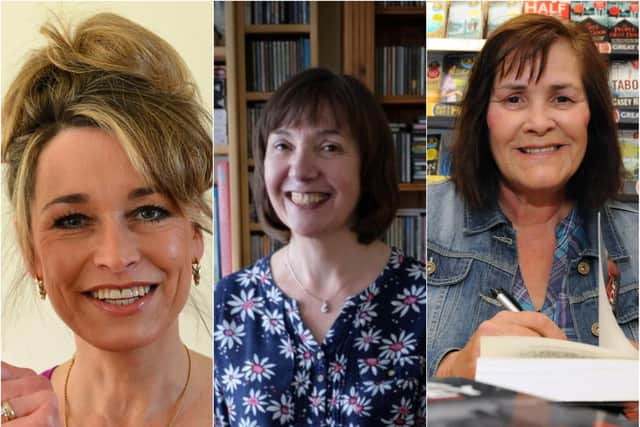A romp through Sunderland's rich literary history - from the Venerable Bede to Lewis Carroll, James Herriot, Terry Deary and the best-selling writers of today
and live on Freeview channel 276
If it isn’t Mackems, or adopted Mackems, who have entertained and informed on the written page, then it’s the place itself providing inspiration.
The latest author to break through is Washington’s own Jessica Andrews, whose 2019 debut novel Saltwater was taken up by major publisher Hodder & Stoughton. The story drew upon Jessica’s experiences growing up in Washington.
Advertisement
Hide AdAdvertisement
Hide AdIt was critically and commercially successful, earning Jessica, still in her 20s, the prestigious Portico Prize early this year.


She has confirmed to the Echo that she’s working on a second novel. The title remains a secret for now, but Jessica did confirm that it’s on the theme of “desire and denial”.
A very long line of Wearside writers have made a mark; just as Wearside has made its mark on writers.
Let’s start by going back many, many years. Once upon a time ...
The Venerable Bede


Advertisement
Hide AdAdvertisement
Hide AdThe seventh and eighth century monk, saint and Mackem was the greatest scholar of his day and a prolific writer of history, geography, hagiography, science, poems and more.
His best known work is his smash hit The Ecclesiastical History of the English People; the page-turner which gave an account of every significant event in this country between the Roman Invasion and AD 731 when the book was written.
Written in Latin (there was no English as such in the eighth century) it’s a highly important reference book on Anglo-Saxon history, which gave England some identity as it emerged from the dark ages as a scattering of separate kingdoms.
Much of it was written at St Peter’s in Monkwearmouth. Although generally agreed to be short on laughs, it’s still the most important work of literature to emerge from Wearside.


William Paley
Advertisement
Hide AdAdvertisement
Hide AdWho hasn’t curled up of an evening with the 1802 book Natural Theology or Evidences of the Existence and Attributes of the Deity by Sunderland philosopher and Rector of Bishopwearmouth, William Paley?
Again, not a rib-tickler, but a seminal book arguing the case for “intelligent design”. Paley argued for the existence of God with his “watchmaker analogy”, which maintains that something as complex and beautiful as the universe and its contents must be designed, rather than accidental.
A highly huffed Richard Dawkins directly responded to the book only 184 years later in The Blind Watchmaker, which has become the atheist’s, er, bible. Paley’s importance remains, whichever side you take.


He died in Bishopwearmouth Rectory (Sunderland Minster) in 1805.
Lewis Carroll
Advertisement
Hide AdAdvertisement
Hide AdCharles Lutwidge Dodgson aka Lewis Carroll, best known for Alice's Adventures in Wonderland, spent much time in Sunderland.
The character of Alice was inspired by Alice Liddell, the daughter of a neighbour. Carroll sketched Alice’s sister Frederika on Roker beach.
Carroll visited his sister Mary in Southwick and his cousins, the Misses Wilcox of Whitburn. It’s believed that the 1871 poem The Walrus and the Carpenter was written there (a bronze statue of Carroll can be found in Whitburn Community Library).
So was Southwick the inspiration for Wonderland? Lewis Carroll hasn’t been around to answer that question since 1898, so we’ll just say yes.


Advertisement
Hide AdAdvertisement
Hide AdThe Alice stories inspired Bryan Talbot’s stunning 2007 graphic novel Alice in Sunderland.
Terry Deary
Terry Deary is one of Britain’s top selling authors, with 326 books published since the 1970s. Sales exceed 33 million, have been printed in 45 languages and adapted for television and film.
By far his most successful books are his Horrible Histories for children, starting in the 1993 with The Terrible Tudors, then on to Groovy Greeks, Awful Egyptians, Rotten Romans and many more.
Deary was born in Sunderland in 1946. His father Bill Deary ran a butcher shop in Hendon. Terry worked there too as a boy and still likes to tell gruesome stories about the place.
Advertisement
Hide AdAdvertisement
Hide AdDeary is something of a controversialist. He has advocated the closure of libraries (partly because they cost authors money). He doesn’t think Durham Cathedral and Castle are particularly worth looking after. He loathes most historians and says schools are a waste of time (his website says “No messages from schools please”).
Whether you agree or disagree with any of that does not detract from his work, which is engaging, fun and, whisper it, educational.
James Herriot
The most famous modern author from Sunderland is James Herriot; born Alf Wight in Brandling Street, Roker in 1916.
Alf re-named himself after a Scottish goalkeeper who played for Birmingham City in the 1960s. He simply liked the name (the real James Herriot is still around today, aged 80).
Advertisement
Hide AdAdvertisement
Hide AdAt three weeks old he moved to Glasgow where he qualified as a vet at the age of 23: “Just when the profession was emerging from a long night of ignorance, into the scientific era” he said.
The world’s most famous vet began his career back in his native Sunderland, where he practised in 1940. But he soon transferred to Thirsk where he would live for the rest of his days. Yet Wearside was never far from his thoughts.
Herriot always saw himself as vet first and author second. He didn’t seriously take up writing until he was 50. His first novel, If Only They Could Talk, was published in 1970 and became a hit the UK and USA.
In 1975 his work was adapted into the film All Creatures Great and Small starring Anthony Hopkins. Then in 1978 it became a BBC series which ran for 89 episodes over 12 years. His books were translated into over 20 languages, including Japanese, selling over 60 million copies.
Advertisement
Hide AdAdvertisement
Hide AdHe loved Sunderland and was a fanatical supporter of its football team. He is most associated with Thirsk, but Wearside never left him.
Chris Mullin
Former MP Chris Mullin is also a writer who commands respect, even among those who would never dream of voting for him.
He first moved to Sunderland when he was elected to represent Sunderland South in 1987, so he easily qualifies as an adopted Mackem.
His 1982 novel A Very British Coup was adapted for television twice. But it’s perhaps his diaries and memoirs which are most lauded, across the political spectrum.
Advertisement
Hide AdAdvertisement
Hide AdHis three-volume diaries cover the Major, Blair and Brown governments. Not only are they thoroughly absorbing and well-written, they’re also remarkably honest. We’re obliged therefore to reiterate that Chris Mullin is a politician
William McGonagall
The Scottish poet (we’ll be generous) William McGonagall is included here more for his unwitting entertainment value than for any literary merit, of which he possessed none.
It’s okay to laugh at him now as he’s been dead since 1902. He was quite extraordinarily bad and utterly deluded. If he was around today he would be on The X Factor, blithely insisting that he was the new Elvis, despite having a voice like an agitated goose.
His “contribution” to Wearside’s literary canon is a poem called The Sunderland Calamity which bore all of his trademark awfulness. It begins:
“’Twas in the town of Sunderland, and in the year of 1883;
“That about 200 children were launch’d into eternity.”
Advertisement
Hide AdAdvertisement
Hide AdBelieve it or not, it gets worse after that. The poem deals with the Victoria Hall disaster. Yet despite the deeply tragic subject matter, it’s difficult not to snigger. Comedy is tragedy plus time.
McGonagall must have felt a tinge of disappointment that the disaster hadn’t occurred six years earlier; 1877 would have rhymed irresistibly with “gone to heaven”.
The Sunderland Calamity lumbers on for 64 perfectly dreadful lines, ending with the gloriously excruciating couplet:
“Her Majesty’s grief for the bereaved parents has been profound
"And I’m glad to see that she has sent them £50.”
Wearside literature today
Advertisement
Hide AdAdvertisement
Hide AdApart from the emerging talent of Jessica Andrews, a trio of Sunderland authors have made their names in recent years, with sales figures to endorse their talents. All three are women.
Making the Sunday Times Bestsellers list with the nine titles of her Shipyard Girls series, is Roker writer Nancy Revell. Nancy’s publishers are literary giants Penguin. Her characters are fictional, but based on real Wearside women who worked in Sunderland’s shipyards during the war.
Similarly, Glenda Young’s three novels so far also garner critical praise. The sagas are set in streets found on a 1919 Ordnance Survey map, but in a very real Ryhope where Glenda is from. She has a six-book deal with publishers Headline.
Thriller writer Sheila Quigley’s novels are set in the fictional Houghton estate of Seahills. They too reached bestseller status before Sheila sadly died in April 2020.
Advertisement
Hide AdAdvertisement
Hide AdA mention too should be made of Sunderland dramatist Fiona Evans. The former St Anthony’s student’s plays are performed on stage and screen. She recently wrote Electricity, starring Glenda Jackson and broadcast on Radio 4.
Miscellaneous - Dickens and Shack
It would be stretching it somewhat for Sunderland to lay claim to Charles Dickens. But it’s worth mentioning that the most famous novelist of them all was familiar with the place.
He appeared at the newly built Lyceum Theatre in Lambton Street 1852 and was terrified by the experience. Long before health and safety, he wrote to a friend that the venue “had only had the slates put upon the roof by torchlight overnight.”
The building was clearly unsafe and dangerously overcrowded. Dickens was relieved that the evening ended without casualties, even though a builder dubiously informed him “there wasn’t a stronger building in the world.”
Advertisement
Hide AdAdvertisement
Hide AdNevertheless, Dickens added: “I never saw such good fellows.”
Three years later the Lyceum Theatre burned down.
In a completely different vein, in addition to being a legendary Sunderland footballer, Len Shackleton knew his less from his fewer too. He became a journalist when his playing career ended.
In 1956 he wrote, if that’s the right word, the most famous passage in any British sports autobiography, The Clown Prince of Soccer. A chapter entitled “The Average Director's Knowledge of Football” consisted of a blank page.
More recently, another former Sunderland player Lee Howey was praised for his 2018 memoir Massively Violent and Decidedly Average.
Advertisement
Hide AdAdvertisement
Hide AdThe former St Aidan’s pupil compensated for a lack of celebrity by simply producing a quality read (Wayne Rooney take note).
So the next time anyone asks what Sunderland’s contribution to literature is…